(完整word版)一般过去时变否定句和一般疑问句
一般过去时的疑问句和否定句

一般过去时的疑问句和否定句一般过去时表示过去某个时间里发生的动作或状态,它的疑问句和否定句形式如下:
1.疑问句:
(1)Was/Were+主语+其他?
(2)Did+主语+动词原形+其他?
例如:
(1)Was he at home yesterday?(他昨天在家吗?)
(2)Did you go to the park last weekend?(你上周末去公园了吗?)
2.否定句:
(1)主语+was/were+not+其他.
(2)主语+did+not+动词原形+其他.
例如:
1.He was not at home yesterday.(他昨天不在家。
)
2.I did not go to the park last weekend.(我上周末没去公园。
)
需要注意的是,在使用一般过去时时,要根据主语的人
称和数来确定be动词的形式,第一人称和第三人称单数用was,其余情况用were;而实义动词则用过去式形式,如went、ate、played等。
(完整word版)初中英语语法一般过去时.

一般过去时口诀一般过去并不难,表示过去(动作、状态)记心间。
动词要用过去式,时间状语句末站。
否定句很简单,didn't动词(原形)前,其它部分不要变。
疑问句也好变,did放在句子前,其它部分依次站。
特殊疑问也简单,疑问句首记心间。
最后一条请注意,动词过去要牢记。
1.概念:过去某个时间里发生的动作或状态;过去习惯性、经常性的动作、行为;2.时间状语:ago, yesterday, the day before yesterday, last week,last(year, night, month, 具体时间, just now, at the age of , one day, long ago, once upon a time(很久以前),3.动词变化规则:规则变化:1 直接加ed eg:work worked worked2 以不发音的e结尾的,+d eg:live lived lived3 以辅音字母+y结尾的,变y为i加ed eg:study stuied stuied4 以重读闭音节结尾的,双写最后的辅音字母+ed eg: stop stopped stopped不规则变化例如相等 eg:cut cut read read<注:read和read读音不同!>sit sat have/has -- had, eat--ate ,see--saw4.否定形式:was/were+not;在行为动词前加didn't,同时还原行为动词。
5.一般疑问句:was或were放于句首;用助动词do的过去式did 提问,同时还原行为动词。
She often came to help us in those days. I didn't know you were so busy.6.一般过去式的构成形式:一般过去时表示句式:主语+过去动词+其他I had a word with Julia this morning.今天早晨,我跟朱丽亚说了几句话。
英语四个基本时态的 肯定句变否定句

_M_r_s_.__L_i_a_n_d__K_i_t_t_y__a_r_e__n_o__t_i_n__a_b__ig__s_h_o_p__. ________ .
8. He is crying(哭) under the tree.
____H__e_i_s_n__o_t__c_r_y_i_n_g_(__哭__)___u_n_d_e_r__t_h_e__t_r_e_e__. _____ .
9. His birthday is on the twentieth of November.
The old man doesn’t do morning exercises(早操) every morning.
23. We are from China.
_________W___e__a_r__e_n__’t__f__r_o_m___C__h_i_n_a__.________ .
24. He goes to the library(图书馆) on Sundays.
_____H_e__d_o_e_s_n_’_t__g_o_t_o__th__e_l_ib_r_a_r_y__o_n_S_u_n_d_a_y_s_.____ .
25. They have a class meeting every week.
_T_h__e_y_d__o_n_’t__h_a_v_e__a__c_l_a_s_s_m__e_e_t_i_n_g__e_v_e_r_y__w__e_e_k_. .
(完整word版)新概念英语第一册全部语法

新概念英语第一册全部语法一.时态:一般现在时,现在进行时,一般过去时,现在完成时,一般将来时,过去进行时,过去完成时,过去将来时1. 一般现在时表示一般性,经常性的动作或一般性事实。
u 含有be动词的句子He is a teacher.The girl is very beautiful.Tim and Jack are students.★变疑问句将be动词移到句首Is he a teacher?Is the girl very beautiful?Are Tim and Jack students?★变否定句在be动词后面加notHe is not a teacher.The girl is not very beautiful.Tim and Jack are not students.★肯定回答及否定回答Yes, he is. No, he is not.Yes, she is. No, she is not.Yes, they are. No, they are not.u 不含有动词的句子,即含有一般动词的句子第三人称单数及单数名词He likes books.She likes him.The dog likes bones.★变疑问句在句首加does, 动词变为原型Does he like books?Does she like him?Does the dog like bones?★变否定句在主语及动词之间加doesn’t, 动词变为原型He doesn’t like books.She doesn’t like him.The dog doesn’t like bones.★肯定回答及否定回答:Yes, he does. No, he doesn’t.Yes, she does. No, she doesn’tYes, it does. No, it doesn’t.注意:第三人称单数形式一般在动词后面加S,不要和名词复数混淆,变否定句或疑问句时名词复数没有任何变化。
(完整版)一般过去时及特殊疑问句

一般过去时一、一般过去时的简介:定义:表示过去某时发生的动作或存在的状态。
结构:“主语+动词的过去式”用法:1。
表示过去某个时间发生的动作或存在的状态.He was here yesterday。
I got up at seven yesterday morning.My mother was at work yesterday afternoon。
Did you have a good time last summer?2.表示过去经常或反复发生的动作。
My mother often went to work by taxi last year.When I was a student, I often listened to music.3。
常与一般过去时态连用的时间有:at that time, then, at that moment, yesterday, yesterday morning (afternoon, evening…)last night (week, month, year…),一段时间+ago(several days ago), two days ago, a week ago, three years ago…in 1990,(in 1997…) ,just now, long before, long long ago二. 动词过去式构成规则1、一般在动词原形末尾加– edhelp → helped, look → looked, play → played, work → worked, listen → listened, wash →washed, clean → cleaned,2、结尾是 e 的动词加—- dlive—--lived hope——-hoped use——-used like ——— liked3、末尾只有一个辅音字母的重读闭音节,先双写这个辅音字母,再加-ed。
完整word版一般过去时讲解
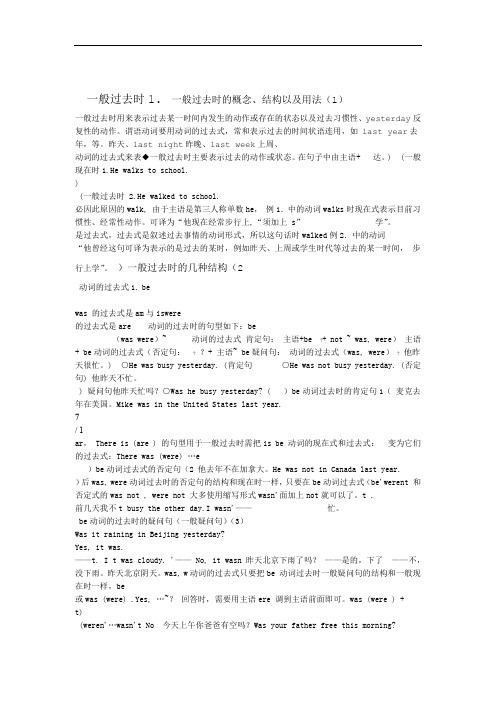
一般过去时1.一般过去时的概念、结构以及用法(1)一般过去时用来表示过去某一时间内发生的动作或存在的状态以及过去习惯性、yesterday反复性的动作。
谓语动词要用动词的过去式,常和表示过去的时间状语连用,如 last year去年,等。
昨天、last night昨晚、last week上周、动词的过去式来表◆一般过去时主要表示过去的动作或状态。
在句子中由主语+ 达。
) (一般现在时1.He walks to school.)(一般过去时 2.He walked to school.必因此原因的walk, 由于主语是第三人称单数he,例1.中的动词walks时现在式表示目前习惯性、经常性动作。
可译为“他现在经常步行上,“须加上 s”学”。
是过去式,过去式是叙述过去事情的动词形式,所以这句话时walked例2.中的动词“他曾经这句可译为表示的是过去的某时,例如昨天、上周或学生时代等过去的某一时间,步行上学”。
)一般过去时的几种结构(2动词的过去式1.bewas 的过去式是am与iswere的过去式是are 动词的过去时的句型如下:be(was were)~ 动词的过去式肯定句:主语+be ?+ not ~ was, were)主语+ be动词的过去式(否定句:??+ 主语~ be疑问句:动词的过去式(was, were)?他昨天很忙。
) ○He was busy yesterday. (肯定句○He was not busy yesterday. (否定句) 他昨天不忙。
) 疑问句他昨天忙吗?○Was he busy yesterday? ( )be动词过去时的肯定句1(麦克去年在美国。
Mike was in the United States last year.7/ 1ar, There is (are ) 的句型用于一般过去时需把is be 动词的现在式和过去式:变为它们的过去式:There was (were) …e)be动词过去式的否定句(2 他去年不在加拿大。
(完整版)一般过去时及特殊疑问句

一般过去时一、一般过去时的简介:定义:表示过去某时发生的动作或存在的状态。
结构:“主语+动词的过去式”用法:1.表示过去某个时间发生的动作或存在的状态。
He was here yesterday.I got up at seven yesterday morning.My mother was at work yesterday afternoon.Did you have a good time last summer?2.表示过去经常或反复发生的动作。
My mother often went to work by taxi last year.When I was a student, I often listened to music.3. 常与一般过去时态连用的时间有:at that time, then, at that moment, yesterday, yesterday morning (afternoon, evening…)last night (week, month, year…),一段时间+ago(several days ago), two days ago, a week ago, three years ago…in 1990, (in 1997…) ,just now, long before, long long ago二. 动词过去式构成规则1、一般在动词原形末尾加–edhelp →helped, look →looked, play →played, work →worked, listen →listened, wash →washed, clean →cleaned,2、结尾是e 的动词加-- dlive---lived hope---hoped use---used like --- liked3、末尾只有一个辅音字母的重读闭音节,先双写这个辅音字母,再加-ed。
一般过去时的否定句和特殊疑问句

一般过去时的否定句和特殊疑问句
过去时的否定句:
一般过去时表示过去发生的动作或状态。
在构成否定句时,在动词前加上“did not”,也可缩写为“didn't”。
以下是一些例句:
1. I did not go to work yesterday.(我昨天没有去上班。
)
2. They did not study for the test.(他们没有为考试学习。
)
3. She didn't like the movie.(她不喜欢这部电影。
)
4. We did not visit the museum.(我们没有参观博物馆。
)
5. He didn't play basketball last night.(他昨晚没有打篮球。
)
特殊疑问句:
特殊疑问句用于询问特殊信息,通常使用疑问词开头。
以下是一些例句:
1. Where did you go on your vacation?(你假期去哪里了?)
2. When did they arrive at the airport?(他们什么时候到达机场的?)
3. Why didn't she join us for dinner?(她为什么没和我们一起吃晚餐?)
4. How did they solve the problem?(他们是如何解决这个问题的?)
5. What did you buy at the grocery store?(你在杂货店买了什么?)
希望以上的信息能帮到您。
若有其他问题,请随时提问。
(完整版)一般过去时及特殊疑问句

般过去时一、一般过去时的简介:定义:表示过去某时发生的动作或存在的状态。
结构:“主语+动词的过去式”用法:1. 表示过去某个时间发生的动作或存在的状态。
He was here yesterday.I got up at seven yesterday morning.My mother was at work yesterday afternoon.Did you have a good time last summer?2. 表示过去经常或反复发生的动作。
My mother often went to work by taxi last year.When I was a student, I often listened to music.3. 常与一般过去时态连用的时间有:at that time, then, at that moment, yesterday, yesterday morning (afternoon, evening⋯)last night (week, month, year⋯),一段时间+ago(several days ago), two days ago, a week ago, three years ago⋯in 1990, (in 1997 ⋯) ,just now, long before, long long ago二. 动词过去式构成规则1、一般在动词原形末尾加–edhelp → helped, look → looked, play → played, work → worked, listen → listened, wash → washed, clean → cleaned,2、结尾是e 的动词加-- dlive---lived hope---hoped use---used like --- liked3、末尾只有一个辅音字母的重读闭音节,先双写这个辅音字母,再加-ed。
(word完整版)史上最全 英语中的16种时态
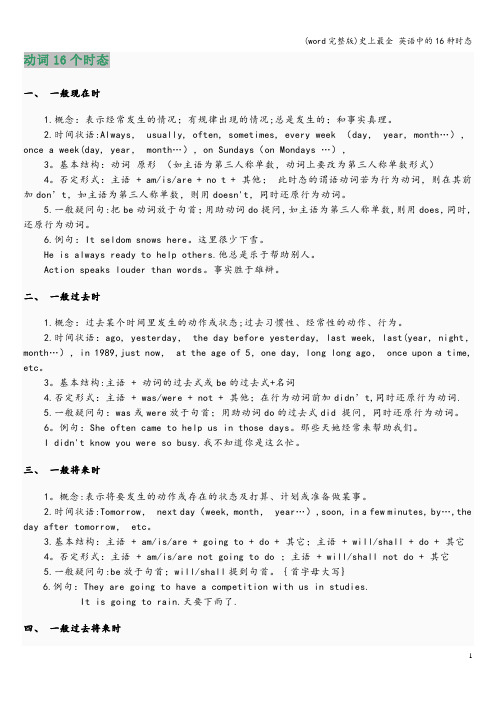
动词16个时态一、一般现在时1.概念:表示经常发生的情况;有规律出现的情况;总是发生的;和事实真理。
2.时间状语:Always, usually, often, sometimes, every week (day,year, month…),once a week(day, year,month…),on Sundays(on Mondays …),3。
基本结构:动词原形(如主语为第三人称单数,动词上要改为第三人称单数形式)4。
否定形式:主语 + am/is/are + no t + 其他;此时态的谓语动词若为行为动词,则在其前加don’t,如主语为第三人称单数,则用doesn't,同时还原行为动词。
5.一般疑问句:把be动词放于句首;用助动词do提问,如主语为第三人称单数,则用does,同时,还原行为动词。
6.例句:It seldom snows here。
这里很少下雪。
He is always ready to help others.他总是乐于帮助别人。
Action speaks louder than words。
事实胜于雄辩。
二、一般过去时1.概念:过去某个时间里发生的动作或状态;过去习惯性、经常性的动作、行为。
2.时间状语:ago, yesterday, the day before yesterday, last week, last(year, night,month…),in 1989,just now, at the age of 5,one day, long long ago, once upon a time, etc。
3。
基本结构:主语 + 动词的过去式或be的过去式+名词4.否定形式:主语 + was/were + not + 其他;在行为动词前加didn’t,同时还原行为动词.5.一般疑问句:was或were放于句首;用助动词do的过去式did 提问,同时还原行为动词。
完整版)一般过去时句型转换专练
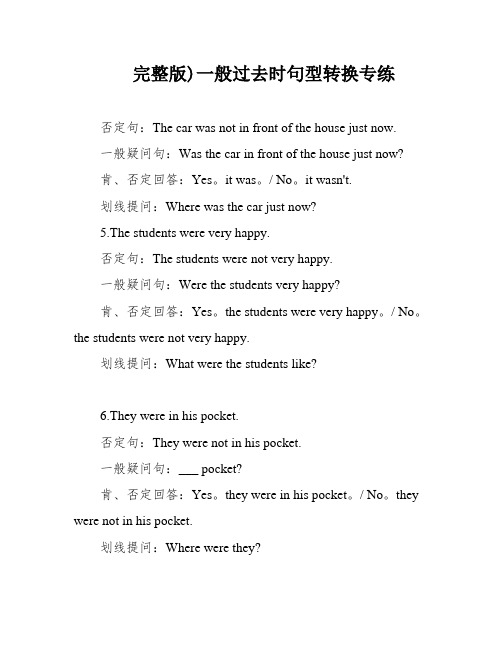
完整版)一般过去时句型转换专练否定句:The car was not in front of the house just now.一般疑问句:Was the car in front of the house just now?肯、否定回答:Yes。
it was。
/ No。
it wasn't.划线提问:Where was the car just now?5.The students were very happy.否定句:The students were not very happy.一般疑问句:Were the students very happy?肯、否定回答:Yes。
the students were very happy。
/ No。
the students were not very happy.划线提问:What were the students like?6.They were in his pocket.否定句:They were not in his pocket.一般疑问句:___ pocket?肯、否定回答:Yes。
they were in his pocket。
/ No。
they were not in his pocket.划线提问:Where were they?7.___.否定句:They did not play football in the playground.一般疑问句:Did they play football in the playground?肯、否定回答:Yes。
___。
/ No。
they did not play football in the playground.划线提问:What did they do in the playground?8.He went out ten minutes ago.否定句:He did not go out ten minutes ago.一般疑问句:Did he go out ten minutes ago?肯、否定回答:Yes。
一般过去时的肯定句,否定句,一般疑问句,特殊疑问句
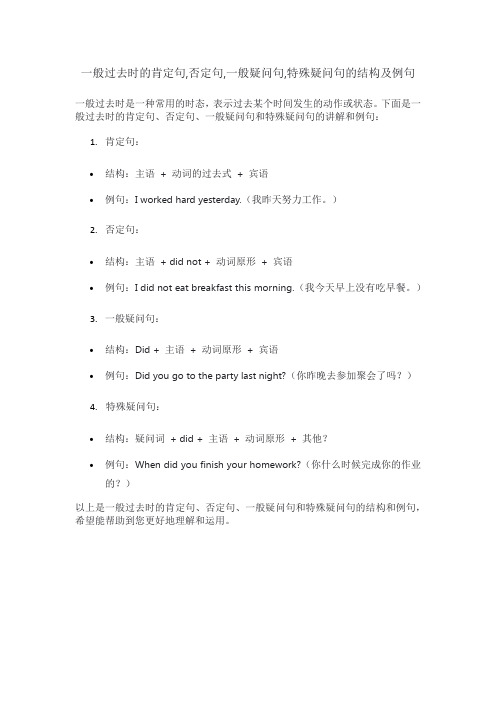
一般过去时的肯定句,否定句,一般疑问句,特殊疑问句的结构及例句
一般过去时是一种常用的时态,表示过去某个时间发生的动作或状态。
下面是一般过去时的肯定句、否定句、一般疑问句和特殊疑问句的讲解和例句:
1.肯定句:
•结构:主语+ 动词的过去式+ 宾语
•例句:I worked hard yesterday.(我昨天努力工作。
)
2.否定句:
•结构:主语+ did not + 动词原形+ 宾语
•例句:I did not eat breakfast this morning.(我今天早上没有吃早餐。
)
3.一般疑问句:
•结构:Did + 主语+ 动词原形+ 宾语
•例句:Did you go to the party last night?(你昨晚去参加聚会了吗?)
4.特殊疑问句:
•结构:疑问词+ did + 主语+ 动词原形+ 其他?
•例句:When did you finish your homework?(你什么时候完成你的作业的?)
以上是一般过去时的肯定句、否定句、一般疑问句和特殊疑问句的结构和例句,希望能帮助到您更好地理解和运用。
六年级一般过去时句型变换
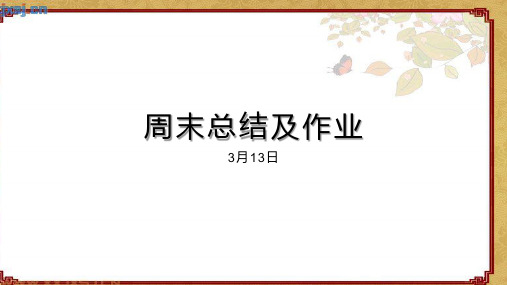
我上周末没看电视。
三、 一般疑问句“Did+主语+动词原形+其他 I watched TV last night.(变为一般疑问句) ----Did you watch TV last night?
肯定回答为 Yes,主语+did,否定回答为“No, 主语+didn't,
如:Yes,I did. / No,I didn't
2、He saw a film yesterday.(变为否定句) He didn't ssaewe a film yesterday
3、I played football this morning. (变为一般疑问句 ,并作肯定回答) Did you I played football this morning ?
周末总结及作业
3月13日
学过的不规则动词过去式
am is--was are--were do--did have has--had
是
是
助动词
有、吃
go--went read--read hurt--hurt can--cound
去
读
弄伤
能
see--saw drink--drank sleep--slept fall--fell
四、特殊疑问句:特殊疑问词+一 般疑问句? What did you do last weekend?
When did you watch TV?
Where did you go last weekend?
How did you go to school?
句型转换
1、Mary does her homework everyday. (用last night改写句子)。 Mary did her homework last night
(完整word)一般过去时练习

时态训练一般过去时(一)I。
一般过去时:表示过去某个时间里发生的动作或状态;过去习惯性、经常性的动作、行为;过去主语所具备的能力和性格。
基本结构:主语+动词过去式+其他 I was at school yesterday 。
I went to America last year 。
否定形式①was/were+not;②在行为动词前加didn’t,同时还原行为动词I wasn’t at school yesterday 。
I didn’t go to America last year ?一般疑问句:Was/ Were +主语+其他?Were you at school yesterday ?Did+主语+动词原形+其他?Did you go to America last year ?时间状语: then那时 yesterday 昨天 at that time在那个时候last night昨天晚上 last week上周 last month上个月 last year去年(last…上一个…)ago 之前 three days ago三天前 many years ago许多年前规则动词变过去式:1、一般直接+ed:walk---walked play--—played start—--started2、以不发音的e结尾的只+d:live———lived hope--—hoped use-——used3、以“辅音字母+y”结尾的动词,先变“y”为“i”再+ed:study--—studied carry———carried4。
以元音字母+y结尾的,直接加ed:enjoy—-—— enjoyed play——--played4、末尾只有一个辅音字母的重读闭音节词,双写末尾的辅音字母再+ed:drop—-—dropped skip---skipped stop——-stopped4.不规则变化:have/has —-had eat—ate see—saw am/is—was are—were go—wentdo—did take-took run—ran sleep—slept get—got meet-metbring—brought buy—bought think—thought can—could write—wrote read—read tell—told say—said give—gave feel—felt fall—fell teach—taughtmake—made send—sent lose—lost swim—swam drink—drankring-rang win—won put—put cut-cut let—let时态训练一般过去时(二)I.写出下列动词的过去式:get --—-_________ come ———-_________ watch -———_________ have ———-_________am/is --——_________ are ————_________ live—--—_________ talk-—-—_________cook -——-_________ work-——-_________ can -———_________ like—--—_________read-——-_________ write —-——_________ dance-—-—_________ give——--_________teach-—-—_________ study—-——_________ eat ———-_________ drink--——_________bring———-_________ help-——-_________ want —---_________ use—---_________stay ————_________ visit--—-_________ ride--—-_________ take -——-_________climb ----_________ wear---—_________ laugh ——--_________ go--—-_________sleep--—-_________ put--—-_________ borrow ———-_________ wait———-_________send-———_________ tell-——-_________ carry -—--_________ drop——-—_________make —--—_________ finish————_________ run —-——_________ meet--—-_________walk————_________ see-—-—_________ wash —-——_________ bump ——--_________play——--_________ skip-——-_________ ring ——--_________ carry —-—-_________win —--—_________ lose----_________ listen--—-_________ fall -—-—_________photo —--—_________ rain ——-—_________ jump—-——_________ happen----________hope ——-—_________ look ———-_________ stop ——-—_________ swim ——-—_________一般过去时(三)单项选择()1。
(完整word版)小学英语四种时态总结
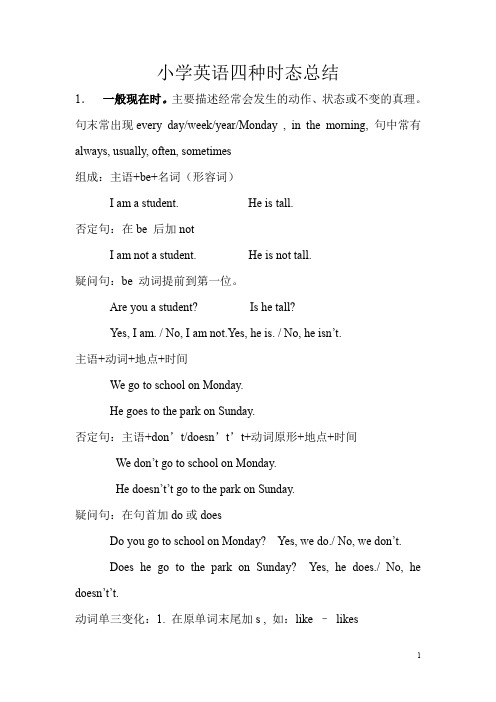
小学英语四种时态总结1.一般现在时。
主要描述经常会发生的动作、状态或不变的真理。
句末常出现every day/week/year/Monday , in the morning, 句中常有always, usually, often, sometimes组成:主语+be+名词(形容词)I am a student. He is tall.否定句:在be 后加notI am not a student. He is not tall.疑问句:be 动词提前到第一位。
Are you a student? Is he tall?Yes, I am. / No, I am not.Yes, he is. / No, he isn’t.主语+动词+地点+时间We go to school on Monday.He goes to the park on Sunday.否定句:主语+don’t/doesn’t’t+动词原形+地点+时间We don’t go to school on Monday.He doesn’t’t go to the park on Sunday.疑问句:在句首加do或doesDo you go to school on Monday? Yes, we do./ No, we don’t.Does he go to the park on Sunday? Yes, he does./ No, he doesn’t’t.动词单三变化:1. 在原单词末尾加s , 如:like –likes2. 单词以o, sh, ch, s, x 结尾加es, 如:go –goes3. 单词末尾为辅音+y结尾去y加ies 如:study- studies2. 现在进行时:主要叙述正在发生的事情。
句末常出现now, 句首常出现look, listen组成:主语+be +动词ing形式I am reading English.They are swimming.He is playing football.否定句:在be后加notI am not reading English.They are not swimming.He is not playing football.疑问句:将be 放到第一位。
(word完整版)英语一般过去时语法知识归纳总结(2),推荐文档

一般过去时语法知识一般过去时表示过去某个时间发生的动作或状态;过去习惯性、经常性的动作、行为;主语在过去时间段所具备的能力和性格。
一般过去时句子最明显的现象就是常由表达过去时间的副词、副词短语或从句来界定。
“过去”的概念并不仅指如“yesterday, last week,……”等,实际上...“.非现在......“.与现在对立的过去........”.,亦即的以前..”.形成对立,就必...............“.现在...........“.过了说话时间的几分钟之前............”.,只要所要表达的时间与说话时的...”.,哪怕是须使用一般过去时来表达。
............例如:He was here only a few minutes ago. 仅仅几分钟前他还在这里。
I came home just now. 我刚回到家。
“this + 时间,today”等时间副词常用于修饰一般现在时,但是只要..........”.对立,..句子的本意是......“.与说话时的现在即使句子中有..必须使用一般过去时。
..........例如:......“.th..i.s. + .时间,....,也.....”.等.时间副词...todayI got up very early this morning. 今天早晨我起床很早。
He was late for school again today. 今天他又迟到了。
强化理解:1. 一般过去时表示在过去某个特定时刻或时期所发生的事情,也可以表示过去习惯性、经常性的动作。
一般过去时只说明过去的事情...........。
..............,.不强调动作对现在的影响I had a word with Julia this morning. 今天早晨,我跟朱丽亚说了几句话。
He smoked many cigarettes a day until he gave up. 他没有戒烟的那阵子,抽烟抽得可凶了。
(完整word版)初中英语语法八大时态总结

初中英语语法八大时态1.结构肯定句式: 主语+动词原形/动词的第三人称单数+其他否定句式: 主语+(助动词)don't/doesn't +动词原形+其他一般疑问句式: Do/Does+主语+动词原形+其他简略回答: (肯)Yes,主语+do/does (否)No,主语+do/does not缩写形式: don't = do not doesn't = does not例句:He often goes swimming in summer.I usually leave home for school at 7 every morning.2.用法1)表示经常的、习惯性的动作或存在的状态,常与表示频度的副词连用。
常用的频度副词有:always、often、usually、seldom、never、sometimes, every week (day, year, month…), once a week, on Sundays.频度副词在句中通常放在行为动词之前,系动词、助动词之后。
例如: He often goes swimming in summer.I usually leave home for school at 7 every morning.2)表示主语具备的性格、特征和能力等。
例如:All my family love football .My sister is always ready to help others .Ann writes good English but does not speak well.3)表示客观真理、客观存在、自然现象。
例如:The earth moves around the sun.Shanghai lies in the east of China.4)表示按计划或安排好的,或将要发生的动作,可用一般现在时表将来。
一般过去式的否定句以及疑问句

⼀般过去式的否定句以及疑问句课后练习⼀般过去式的否定句1.动词是Be动词时,⼀般过去时的否定式是在be动词后加not。
句型:主语+wasn’t/weren’t…I was in Beijing yesterday. We were in Beijing yesterday.否定句:I wasn’t in Beijing yesterday. We weren’t in Beijing yesterday. Exercises(练习):( ) 1. It ____________ (not be) Ben's birthday last Friday.A. wasn’tB. weren’tC. isn’tD. aren’t( ) 2. These men_________________ (not be) firemen a week ago.A. wasn’tB. weren’tC. not beD. aren’t( ) 3. They _____________ (not be) in Beijing three days ago.A. wasn’tB. weren’tC. not isD. aren’t( ) 4. It ____________ (not be) the 2nd of November yesterday.A. wasn’tB. weren’tC. not areD. aren’t2.动词是⾏为动词时,⼀般过去时的否定式是在动词原形前加助动词did not (didn’t).句型:主语+didn’t+动词原形I told them the news yesterday.否定句:I didn’t tell them the news yesterday.Exercises(练习):1. Miss Guo ______________ (not get) up late the day before yesterday.2. We all ______________ (not have) a good time three days ago.3. She _____________ (not find) a beautiful butterfly just now.4. I ____________ (not watch) a cartoon yesterday evening.5. Her father ___________ (not read) a newspaper last night.⾏为动词⼀般过去时的疑问式⼀、⼀般过去式的⼀般疑问句:1.有be动词时,把be动词提前句型:Was+主语+…? / Were+主语+ … ?There were three cups of tea on the table just now.⼀般疑问句:Were there three cups of tea on the table just now?Yes, there was. No, there wasn’t.1. There were some oranges in the cup.(变⼀般疑问句)_________ there ___________ orange in the cup?2. It was Monday yesterday. (变⼀般疑问句)_________ it Monday yesterday?3. Mary and Mike were in Shanghai last month. (变⼀般疑问句)_________ Mary and Mike in Shanghai last month.2.动词是⾏为动词时,在句⾸加助动词didDid+主语+动词原形+其他?They finished their work at four.⼀般疑问句:Did they finish their work at four? Yes, they did. No, they didn’t. Exercises(练习):1._______ he ______ (go) to that morning? Yes, he _____.2._________your brother ___________(find) some meat in the fridge(冰箱). No, he _________.3.________ Mary _______ (read) an interesting book about history? Yes, she __________.4.________ the students of Class Six _________(have) an English lesion the day before yesterday? No, they didn’t.⼆、⼀般过去时的特殊疑问式1.动词是⾏为动词时: 疑问词+did+主语+动词原形……?They finished their work at four.A B对划线部分提问: A:What did they do at four?B:When did they finish their work?Exercises(练习):1.They went to park by car yesterday.________ _________ they __________ to park yesterday?2.They did their homework yesterday evening.________ did they_________ yesterday evening?3.Her sisters flew kites in the park last Friday.________ did her sisters _________kites last Friday?4. I liked the red shirt in the past.________ shirt did you ________ in the past.2.有be动词时: 疑问词+ was/were+主语+其他?Jack was in the classroom just now.A B对划线部分提问: A: Who was in the classroom just now? B: Where was Jack just now?1.Mary and Peter were in Beijing five days ago.________ ________ Mary and Peter five days ago? 2.There were four teachers in the office._______ ________ teacher _______ there in the office?3.He was a policeman last year._______ ________ he in the past?4.Mike was a teacher in the past.________ _________ a teacher in the past?。
一般过去时

表示过去发生的动作或状态。
一.表示状态使用:主语+be(过去式)+表语+时间状语具体见下表:主语+be(过去式)+表语+时间状语主语be 表语时间状语人称代词主语i / she / he / it was1.形容词2.名词3. 人称代词宾格(me /you / her /him / it /us /them)1.表示过去的时间副词2.副词ago(…前)相关(1.a/an/one+表时间名词单数+ago;2.数词+表时间名词复数+ago)3.介词in(在)+表过去年份数词st(上一)+表时间名词单数5.that/this(那/今)+表时间名词单数we / you / they were指示代词that / this was these / those were名词可数名词单数和was可数名词复数were不可数名词was 单个人(地)名was并列多个个人(地)名were名词使用规则1.可数名词单数必须加限定词或冠词。
2.可数名词复数和不可数名词不加限定词或冠词一般是泛指某一类。
变一般否定句:主语+be(过去式)+not +表语+时间状语变一般疑问句:be(过去式)+主语+表语+时间状语?(此时注意人称代词如i的改变和be动词的改变。
)肯定回答:yes,主语+be(过去式)否定回答:no,主语+be(过去式)+not二.表示动作使用:主语+谓语+宾语具体见下表:主语+(及物动词过去式)谓语+宾语+时间状语主语+(不及物动词过去式)谓语+时间状语主语谓语宾语时间状语人称代词主格i / she / he / it / we/ you / they1.及物动词过去式1.名词或人称代词宾格1.表示过去的时间副2.副词ago相关(1.a/an/one+表时间名词单数+ago2.数词+表时间名词复数+ago)3.介词in+表过去年份数词st+表时间名词单数5.that/this+表时间名词单数名词包括:单个或并列人(地)名、可数名词单数或复数、不可数名词。
- 1、下载文档前请自行甄别文档内容的完整性,平台不提供额外的编辑、内容补充、找答案等附加服务。
- 2、"仅部分预览"的文档,不可在线预览部分如存在完整性等问题,可反馈申请退款(可完整预览的文档不适用该条件!)。
- 3、如文档侵犯您的权益,请联系客服反馈,我们会尽快为您处理(人工客服工作时间:9:00-18:30)。
按要求改写句子:
1、He was my father.
变否定句:
变一般疑问句:
肯定回答:
否定回答:
2、My mother was a teacher two years ago.
变否定句:
变一般疑问句:
肯定回答:
否定回答:
3、You were a beautiful girl.
变否定句:
变一般疑问句:
肯定回答:
否定回答:
4、I was a boy.
变否定句:
变一般疑问句:
肯定回答:
否定回答:
5、I liked football.
变否定句:
变一般疑问句:
肯定回答:
否定回答:
6、She lived in China ten years ago.
变否定句:
变一般疑问句:
肯定回答:
否定回答:
7、He wanted to go to school.
变否定句:
变一般疑问句:
肯定回答:
否定回答:
8、Her uncle worked in a hospital last year.
变否定句:
变一般疑问句:
肯定回答:
否定回答:
9、My shoes were on the floor just now.
变否定句:变一般疑问句:
肯定回答:
否定回答:
10、There were five apples in the basket two minutes
ago.
变否定句:
变一般疑问句:
肯定回答:
否定回答:
11、I had a baskerball.
变否定句:
变一般疑问句:
肯定回答:
否定回答:
12、She had some books.
变否定句:
变一般疑问句:
肯定回答:
否定回答:
13、I thought she was kind.
变否定句:
变一般疑问句:
肯定回答:
否定回答:
14、She thought he was good at math.
变否定句:
变一般疑问句:
肯定回答:
否定回答:
15、Her mother and her father were doctors.
变否定句:
变一般疑问句:
肯定回答:
否定回答:
16、He did his homework every day.
变否定句:
变一般疑问句:
肯定回答:
否定回答:
17、My birthday is September 5th.
变否定句:
变一般疑问句:
肯定回答:
否定回答:
18、His favorite subject was Chinese.
变否定句:
变一般疑问句:
肯定回答:
否定回答:
19、It was a clever dog.
变否定句:
变一般疑问句:
肯定回答:
否定回答:
20、I went shopping with my friend.
变否定句:
变一般疑问句:
肯定回答:
否定回答:。
